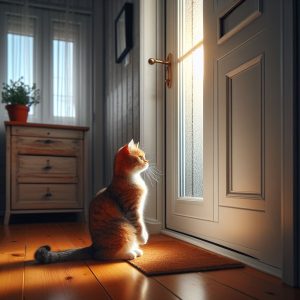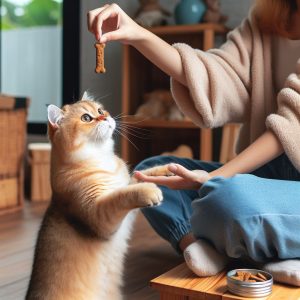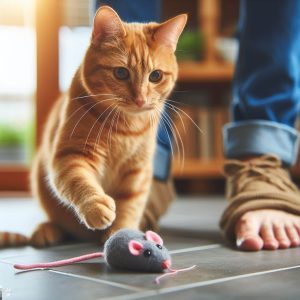As a cat owner, you want your feline friend to be healthy and happy. However, if your cat seems hungry all the time yet keeps losing weight, it can be puzzling and worrying. In this article, we’ll explore the top reasons for increased appetite and weight loss in cats. We’ll also provide tips to help get your cat back to a normal weight.
Common Medical Causes
Cats can lose weight and act hungrier for several medical reasons. If your skinny cat’s appetite is out of control, have your vet run tests to identify any underlying conditions. Here are some of the most common medical causes of weight loss and increased hunger in cats:
Hyperthyroidism
Hyperthyroidism is one of the most common reasons older cats experience weight loss along with a ravenous appetite. With hyperthyroidism, the thyroid gland becomes overactive and produces too much thyroid hormone.
Cats over 10 years old are prone to developing hyperthyroidism. The excess thyroid hormone revs up the metabolism, so cats burn calories faster. This leads to increased hunger as the body tries to compensate. Cats can’t seem to eat enough to maintain their weight.
Symptoms of hyperthyroidism include:
- Weight loss despite a healthy appetite
- Constant hunger and begging for food
- Increased thirst and urination
- Restlessness, hyperactivity
- Vomiting, diarrhea
- Unkempt coat, shedding
Blood tests can confirm abnormally high thyroid hormone levels. Once diagnosed, hyperthyroidism is treatable through daily medication, radioactive iodine therapy, or surgical removal of the thyroid gland. With successful treatment, metabolism and appetite usually return to normal.
Diabetes
Diabetes is another common cause of unintended weight loss and increased hunger in cats. With diabetes, the body loses its ability to regulate blood sugar properly. Glucose builds up in the bloodstream instead of being absorbed by cells for energy.
To compensate, the body tries to flush out all the excess blood glucose through increased urination. This causes dehydration and the loss of calories from sugary urine. So diabetic cats tend to drink and urinate more. The calories lost through frequent urination exceed the calories consumed through increased eating. That’s why diabetic cats continue losing weight despite having a bigger appetite.
Signs of feline diabetes include:
- Increased thirst and urination
- Weight loss paired with increased appetite
- Lethargy, weakness
- Poor coat condition
- Cloudy eyes if untreated
Diabetic cats may also vomit frequently due to nausea and infections setting in. Diagnosis involves detecting high blood glucose on lab tests. Daily insulin injections can regulate blood sugar in most cats. A high protein, low carbohydrate diet also helps control symptoms. With proper treatment, diabetic cats can gain weight and require normal portions.
Gastrointestinal Disorders
Cats with gastrointestinal issues like chronic vomiting, diarrhea, constipation and malabsorption struggle to digest food properly. Nutrients aren’t absorbed well, leading to weight loss over time. Nausea and intestinal inflammation also suppress appetite.
To compensate, cats with gastrointestinal disorders often eat more frequently but in smaller portions. The body tries to get adequate nutrition and energy from extra small meals. But continued GI problems prevent cats from gaining and maintaining weight.
Some causes for chronic digestive issues include:
- Food allergies or intolerances
- Inflammatory bowel disease (IBD)
- Parasites
- Cancer or polyps in the digestive tract
- Dysbiosis or overgrowth of unhealthy gut bacteria
Diagnostic tests like bloodwork, stool exams, biopsies and ultrasounds help determine the cause. Treatment depends on the specific condition identified but may include medication, special diets, supplements and probiotics. Controlling GI symptoms is key to helping cats digest and absorb nutrients from food properly.
Chronic Kidney Disease
When cats suffer from chronic kidney disease, their kidneys have a tough time removing metabolic waste products and toxins from the bloodstream. This causes loss of appetite, nausea, vomiting and weight loss.
Excess urea builds up in the blood and can make cats feel too sick to eat much. Trying to metabolize protein also stresses the kidneys further. To keep their remaining kidney function stable, cats instinctively cut back on protein-rich foods. However, restricting protein intake means reducing calories and muscle mass over time.
Cats with chronic kidney disease need easily digestible diets with moderate levels of high quality protein. This provides enough nutrition without taxing the kidneys. Phosphorus levels may also need to be limited to prevent further kidney damage.
With the right nutritional management and care, cats with chronic kidney disease can regain their appetite and stabilize their weight. But their caloric needs are less than healthy cats due to reduced kidney function and muscle mass.
Cancer
Feline lymphoma, intestinal cancer and other tumors can interfere with nutrient absorption. Cancerous cells compete for nutrients, leaving less available for healthy tissue. Tumors may also obstruct the intestines, making digestion difficult.
The subsequent weight loss then stimulates appetite as the body tries to get more nutrition. But cancer ultimately causes progressive weight loss and muscle wasting in cats. Providing cats with cancer high calorie supplementation or force feeding may become necessary.
Treating the underlying cancer can improve appetite and weight gain. But cats with advanced cancers that resist treatment continue losing weight despite increased hunger. In this case, keeping them comfortable with appetite stimulants and anti-nausea medication provides the most benefit.
Liver Disease
Disorders like hepatic lipidosis and cholangiohepatitis reduce liver function. The liver processes nutrients and produces substances that aid digestion and stimulate appetite. Dysfunction of the liver leads to poor nutrient utilization.
Toxins also build up which lower appetite and cause nausea. Increased hunger paired with weight loss develops as the body struggles to extract energy and nutrition from food. Supportive care like IV fluids, vitamins, and force feeding help restore liver function. But severe liver disease causes progressive cachexia.
Exocrine Pancreatic Insufficiency
The exocrine pancreas produces enzymes needed to break down and digest fats, proteins, and carbs. Pancreatic insufficiency or damage impairs digestion of nutrients. Undigested molecules then get flushed out in stool rather than absorbed.
With fewer usable calories making it into the body from food, cats eat more to compensate. But they continue losing weight without proper enzyme supplementation to aid digestion. Blood tests and vitamin levels help diagnose EPI in cats. Daily enzyme supplements in meals and fat-soluble vitamin provision resolves the maldigestion.
Hypermetabolism
Some disorders like hyperthyroidism increase feline metabolism, as discussed earlier. But even without disease, some cats have naturally high metabolisms and burning of calories. This results in cats being underweight and hungry despite adequate feeding.
Hypermetabolism may occur in especially active breeds like Siamese or Bengals. Young cats and recent spays/neuters can also have increased caloric needs for proper growth and development. There are no tests for generic hypermetabolism in cats. The solution is simply feeding cats high calorie, high protein foods.
Parasites Causing Weight Loss and Hunger
Along with diseases, intestinal parasites are another common cause of appetite and weight changes in cats. Parasites like roundworms and hookworms live in the cat’s digestive system and steal nutrients. This leads to cats being constantly hungry as their food gets absorbed by parasites instead of their own body.
Severe infestations can cause:
- Dull coat
- Pot bellied appearance
- Weight loss and lean muscle wasting
- Increased appetite but poor growth in kittens
Tip: Deworming medications clear out parasites and allow cats to gain weight normally. Kittens should be dewormed regularly until 6 months old. Annual fecal tests help detect parasites in adult cats for early treatment.
Additionally, fleas and ticks on cats can lead to anemia from blood loss. This again increases hunger as the body tries to compensate for the shortage of iron and nutrients. Controlling external parasites through monthly preventatives is important to prevent anemia and support proper weight.
Underlying Stress and Behavior Issues
For some cats, physical causes can be ruled out through veterinary exams and testing. In these cases, psychological factors may be impacting your cat’s appetite and weight. Here are some examples:
Anxiety
Cats experiencing stress or anxiety may compulsively overgroom. Excessive licking and grooming burns extra calories. Sudden changes, new environments, separation from owners or conflict with other pets can trigger anxiety in cats. This causes increased appetite paired with weight loss.
Try to identify and minimize stressors in your cat’s environment. Providing environmental enrichment through toys, scratching posts and hiding spots also helps lower anxiety. In severe cases, anti-anxiety medications may be temporarily needed.
Boredom
Lack of physical and mental stimulation can lead some cats to overeat out of boredom. But if the excess calories are burned through play and exercise, bored cats stay slim. Ensure yours has plenty of enrichment activities during the day. Interactive feeders make them work for meals, reducing boredom eating.
Begging and Finickiness
Some cats beg and meow persistently for food without actually finishing portions. Giving in and refilling the bowl trains cats to become picky. Finicky cats only eat a few bites of their favorite foods. But the small meals don’t meet caloric needs for proper weight maintenance.
Sticking to a consistent, scheduled feeding routine prevents begging. Praising and treating when your cat finishes a whole meal shapes positive behavior. Rotate between a few favorite foods to keep your cat interested.
Dental Problems
Untreated dental infections, loose teeth, resorptive lesions or stomatitis make chewing kibble painful. Cats may chew and swallow partially before dropping the remainder. Difficulty eating leads to weight loss and hunger. But the cat can’t gain weight until the mouth pain is addressed.
Regular dental exams and professional cleanings are essential. Signs like bad breath, drooling and dropping kibbles signal a sore mouth requiring treatment. Soft, canned foods make eating more comfortable while dental issues heal.
Tips to Help Your Skinny Cat Gain Weight
If your cat is underweight despite having a robust appetite, here are some tips to help them gain weight safely:
Have your vet examine your cat
Sudden weight loss warrants a full checkup to identify underlying causes. Routine bloodwork, fecal exams and imaging tests check for conditions like hyperthyroidism, kidney disease and cancer. Dental exams ensure there is no mouth pain impeding eating.
Switch to high calorie prescription food
Veterinary clinics carry prescription diets for underweight cats that are calorie and protein dense. Royal Canin Recovery RS, Purina Pro Plan EN Gastroenteric, Hills a/d and Iams Maximum Calorie are examples. These foods help cats start gaining even if they can’t eat large volumes.
Feed smaller, more frequent meals
Instead of one or two large meals, feed tiny portions 3-6 times a day. Cats with health conditions often tolerate and digest small feeds better. Timed automatic feeders help provide a consistent schedule.
Make food more appealing
Warming wet food slightly releases aroma and makes it more enticing. Gently hand feeding lets your cat eat at their own pace. Adding tasty mix-ins like bone broth, powdered parmesan, fish oil or nutritional yeast boosts flavor.
Supplement with nutritionally balanced oils
Adding corn, coconut, fish or flaxseed oil to meals boosts calorie density. But check with your vet, as excess fats could be detrimental depending on your cat’s condition.
Try appetite stimulants
Drugs like cyproheptadine and mirtazapine help jumpstart appetite in cats. They are used short term along with dietary changes to promote weight gain.
Consider assisted feeding
If your cat is refusing most food, your vet may advise assisted feeding. This involves gently syringe feeding prescription recovery foods or gruel. It meets calorie needs and prevents liver damage from starvation until appetite improves.
Weigh your cat weekly
Keep close tabs on your cat’s weight using a pet scale. Note fluctuations to determine if calorie intake and treatments are working. Aim for consistent weight gain or stabilization week over week.
Have patience and watch for consistency
It takes time to determine effective diets and medication regimens for individual cats. Some conditions cause periods of weight loss and gain. Focus on the overall trend month to month. With close monitoring and patience, your cat can reach an optimal weight.
When to Seek Veterinary Help
Contact your vet promptly if your cat:
- Loses over 10% of their body weight quickly
- Vomits frequently and cannot keep food down
- Has diarrhea lasting over 3 days
- Loses interest in all food and appears weak
- Feels thinner over their hips and spine
Significant weight loss can lead to hepatic lipidosis, a dangerous liver condition. Seeking prompt veterinary treatment helps get your cat’s weight back on track before their health declines further.
While a picky appetite and slight weight fluctuations are normal in cats, significant uncontrolled hunger and weight loss are not. Work closely with your vet to uncover the reasons behind your cat’s insatiable appetite and difficulty gaining weight. Underlying health issues must be addressed to get your cat back to a normal nutritional plane.
Frequently Asked Questions
How much should my cat eat daily?
The average 10 lb housecat needs 150-300 calories per day. But requirements vary based on age, activity level, health status, and metabolism. Check your cat food’s calorie count and feed accordingly. Weighing portions and monitoring intake helps meet needs.
How often should cats eat?
Most cats do well with two or three scheduled feedings a day. Free-choice feeding leads to overeating in some cats. Timed treat dispensers also help provide mental enrichment between meals. Check with your vet if your cat needs more frequent small meals for medical reasons.
What is the best diet for a skinny cat?
Cats with health conditions often benefit from prescription high calorie diets. These provide concentrated protein and fat for more calories in smaller volumes. For healthy cats, pick high protein, grain-free foods with real meat. Avoid fillers or artificial ingredients that can cause allergies.
Can I fatten up my cat?
Avoid forcing excessive food just to see weight gain on the scale. This risks obesity and related conditions like diabetes down the road. Work with your vet to determine your cat’s optimal weight. Only use prescription weight gain diets if your cat is underweight due to an underlying medical disorder.
When should I worry about rapid weight loss in cats?
Contact your vet promptly if your cat loses more than 10% of their body weight in a short period of time. Rapid weight loss can indicate serious medical conditions requiring urgent diagnosis. For example, uncontrolled hyperthyroidism carries risks of heart failure.
Conclusion
As a cat owner, it’s worrying to see your feline companion drop weight despite having a ravenous appetite. But try not to panic. There are many treatable reasons for changes in your cat’s hunger and weight.
Work with your veterinarian to identify any underlying condition through diagnostic testing. Finding the cause is key to getting your cat back to a healthy nutritional status. With time, patience and monitoring, your underweight cat’s appetite should balance out and their weight should normalize.
Focus on providing a consistent diet, calming environment, and plenty of enrichment at home. And schedule regular checkups to stay ahead of emerging health issues before they result in increased hunger and weight loss. With supportive care tailored to your cat’s needs, a lean feline can thrive and regain strength.



